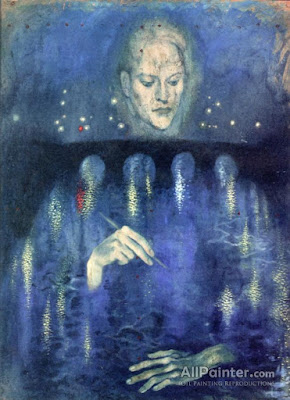On the passing of Charles Henri—all these years later.
 |
| Portrait of Charles Henri Ford by Pavel Tchelitchew. |
Unbelievably, today marks the 19th anniversary of Charles’s passing at the age of 94. When I wrote about Ruth on the anniversary of her passing, I wondered how she would have fared in the pandemic, and I can’t help but wonder the same about Charles. I do think Ruth and Charles were both very lucky to have had long, exciting lives and to have made their escapes before this happened. Of course there were plenty of terrible diseases to contend with in their own lifetimes, but somehow they managed to live through them all and into their nineties.
In Charles’s youth he had a lot of the usual diseases that kids would get (and sometimes die of). He spoke of mumps and fevers, and once one of his school roommates was diagnosed with malaria which was not contagious, luckily for Charles. He would write about a terrible bout with gonorrhea he had in the early 1930s and its long and painful treatment, well before antibiotics came along and simplified everything. He got all kinds of bugs and ailments, and he would describe them in letters, such as one he wrote to his friend and co-author Parker Tyler, in 1932:
“I woke up the morning after drinking beer by order of Dr. H. because he wanted to see if it would affect my prostate gland so he could better see if I’m over my own gonorrhea—with a violent headache sore left tonsil and fever 103 which rose that night to 105 the death temperature but back down to normal now the third day. I broke out in a light rash as to forehead and arms and it may have been chickenpox. The Dr. is coming again tomorrow.”
Among his friends from the time there were a few early deaths from illnesses, things like Typhus or a strange fever caught while traveling. Charles travelled a lot in his young years, and it was really more luck than anything that kept him from catching something fatal. He was ten in 1918 and didn’t get the flu. If he were here now, I would ask him if he remembered much from that period, now that the United States has counted more deaths from Covid than there were during the 1918 flu pandemic.
Being the social person that he was, I really don’t know how Charles would have fared having to keep away from people. No doubt he would have made good use of lockdown time. He would probably have a book or two worth of collages and poems to show for it. But it’s hard to say what he would have thought. I’ll probably always wonder what Charles would think in every new situation that comes up. I might not always be able to guess at his opinions, but he’d definitely have some, that much I know. Charles always had a good outlook, and he would always find things to be curious about and ways to satisfy his curiosities. His curiosity is one of his most inspiring qualities and even in these uncertain times, curiosity is worth a lot. Keep living, keep looking, there’s still a lot to see. If I could ask him his opinion about everything happening now and what best to do, he might say something like that.
Thinking of you, Charles. Wherever you are, I hope it’s sunny and exciting.
 |
| Portrait of Charles Henri Ford by Pavel Tchelitchew. |
Charles Henri Ford
1908-2002-2021
Indra Tamang
September 27th, 2021
Copyright © Indra Tamang 2021, all rights reserved.





